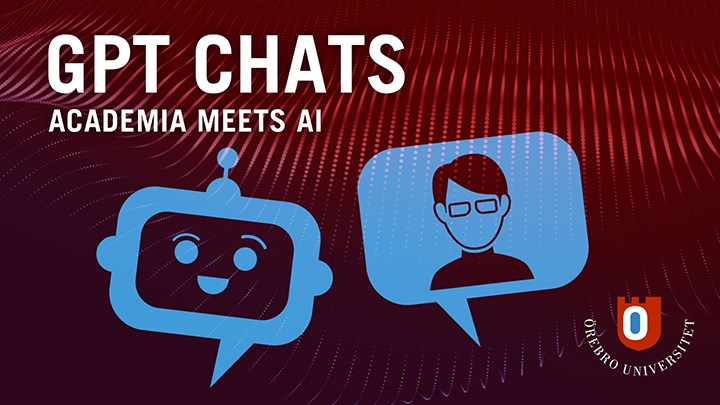Örebro University launches new AI-powered research podcast

Music and masculinity, problematic guts, pollution and crime. These are just some of the themes featured in Örebro University's new podcast, GPT Chats: Academia meets AI, launching this week.
Where to find GPT Chats: Academia meets AI Spotify: GPT Chats on Spotify Apple Podcasts: GPT Chats on Apple
"The podcast is in English and created for curious minds who want to learn more about research and how it affects the world around us," says Tim Stubbings, alumni coordinator at Örebro University and producer of the new show.
In the first seven episodes, seven researchers from Örebro University take a deep dive into the challenges and opportunities they face – and what the future of research in their fields might look like.
What makes GPT Chats unique is that the interviews aren’t conducted by a human host – but by artificial intelligence (AI).
“We’ve created an AI expert for each researcher, loaded with insights from their published articles, that can ask intelligent, friendly, and curious questions in real time. The results are conversations that are insightful, informative and surprising – and sometimes a bit dysfunctional too,” explains Tim Stubbings.
Each episode lasts around 25 minutes. The first three are available on Spotify and Apple during week 28, with the remaining four launching weekly between weeks 29 and 32.
"From pollution and crime to intestinal troubles, masculinity and music – it’s a collection of smart, entertaining, and surprisingly human conversations," says Tim Stubbings.
Here are the seven episodes in the first season of GPT Chats: Academia meets AI
Fishy Tales and Family Trees: Pollution's Long Reach
What can tiny fish tell us about pollution? Quite a lot, actually. In this pilot episode of GPT Chats: Academia meets AI, we talk with Professor Steffen Keiter about how zebrafish help uncover the hidden dangers of chemicals in our environment — from microplastics to toxic legacies passed down through generations. It’s a deep dive into how pollution today could be shaping life tomorrow, and in ways we’re only starting to appreciate.
Pain, Psychology, and the Power of Perception
Is pain all in your head? Not exactly — but your brain definitely plays a starring role. In this episode psychologist Sofia Bergbom unpacks how our thoughts, emotions, and stress levels can shape our experience of physical pain. We talk about why some people bounce back from pain while others spiral, how mood and mindset affect recovery, and how validating someone's emotional pain is such a powerful tool in therapy. It’s a fresh, surprising take on something we all feel, but rarely understand.
Invisible Influencers: Microbes and Your Mental Mojo
Can your gut really talk to your brain? In this episode we chat with Julia Rode from Örebro University about the science behind the gut-brain connection. She explains how tiny microbes in your digestive system might shape how you feel, think, and handle stress — and what probiotics have to do with it all. If you’ve ever wondered how your belly and brain stay in sync, this one’s for you.
Rewriting the Score: Music and Masculinity
What does your playlist say about who you are — and how you see the world? In this episode of GPT Chats: Academia meets AI sociologist and musicologist Sam de Boise joins us to unpack how music not only reflects but also shapes ideas about masculinity, emotion, and even politics. From why some music is seen as more 'masculine' to how the far-right uses digital platforms to push ideology, we explore the surprising ways music, politics and identity collide — and why it matters.
Electric Dreams? The Winding Road to Sustainable Trucking
Sustainability researcher Sophie-Marie Ertelt helps us navigate Europe’s road freight strategy, pointing out a few potholes and bumps along the way. We chat about electric truck adoption, policymaker dilemmas, and why the humble delivery van might be the climate sleeper issue of our time. With warmth, wit, and clarity, Sophie-Marie shows us that real change isn’t just about new vehicles — it’s about new mindsets.
Gut Instincts: Rethinking How We Detect and Treat IBD
What if we could predict who’ll get Crohn’s or colitis — and even stop it before it starts? We sit down with Professor Jonas Halfvarson, a leading expert in inflammatory bowel disease (IBD). We talk about poop, precision medicine, and the big future of IBD research. Whether you’re a science buff, a future researcher, or just someone with a gut feeling that health is more than skin-deep, this episode is for you.
The Curious Case of ‘What Causes Criminality?’
What really drives someone to commit a crime? In this season-ending episode of GPT Chats: Academia meets AI criminologist Amber Beckley joins us to unpack the surprising science behind criminal behaviour — and it’s not what you see on TV. We talk about childhood experiences, school systems, and why people can change. With insights from decades of data, Amber offers a fresh, hopeful take on how we understand crime — and how we might prevent it.
Text: Anna Lorentzon
Translation: Tim Stubbings
